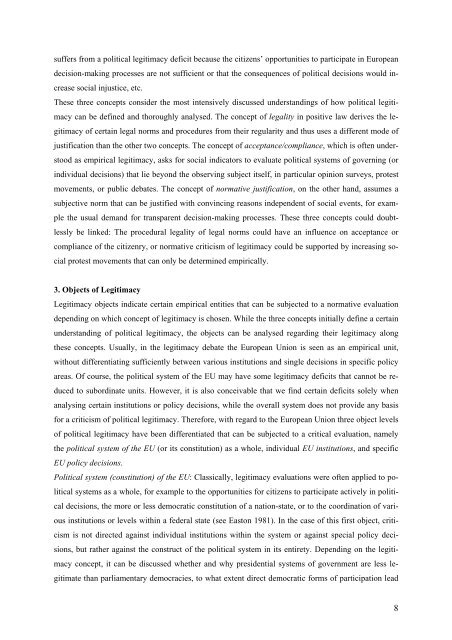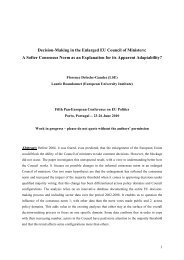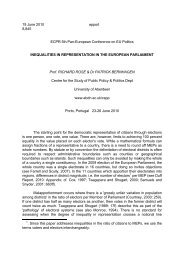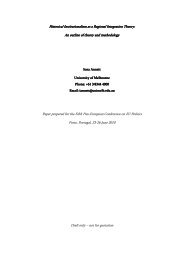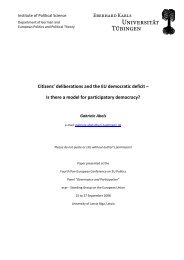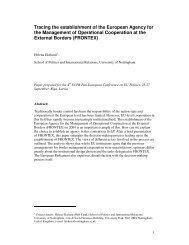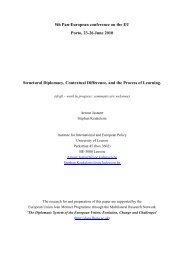Theorising the Democratic Legitimacy of European Governance
Theorising the Democratic Legitimacy of European Governance
Theorising the Democratic Legitimacy of European Governance
You also want an ePaper? Increase the reach of your titles
YUMPU automatically turns print PDFs into web optimized ePapers that Google loves.
suffers from a political legitimacy deficit because <strong>the</strong> citizens’ opportunities to participate in <strong>European</strong><br />
decision-making processes are not sufficient or that <strong>the</strong> consequences <strong>of</strong> political decisions would increase<br />
social injustice, etc.<br />
These three concepts consider <strong>the</strong> most intensively discussed understandings <strong>of</strong> how political legitimacy<br />
can be defined and thoroughly analysed. The concept <strong>of</strong> legality in positive law derives <strong>the</strong> legitimacy<br />
<strong>of</strong> certain legal norms and procedures from <strong>the</strong>ir regularity and thus uses a different mode <strong>of</strong><br />
justification than <strong>the</strong> o<strong>the</strong>r two concepts. The concept <strong>of</strong> acceptance/compliance, which is <strong>of</strong>ten understood<br />
as empirical legitimacy, asks for social indicators to evaluate political systems <strong>of</strong> governing (or<br />
individual decisions) that lie beyond <strong>the</strong> observing subject itself, in particular opinion surveys, protest<br />
movements, or public debates. The concept <strong>of</strong> normative justification, on <strong>the</strong> o<strong>the</strong>r hand, assumes a<br />
subjective norm that can be justified with convincing reasons independent <strong>of</strong> social events, for example<br />
<strong>the</strong> usual demand for transparent decision-making processes. These three concepts could doubtlessly<br />
be linked: The procedural legality <strong>of</strong> legal norms could have an influence on acceptance or<br />
compliance <strong>of</strong> <strong>the</strong> citizenry, or normative criticism <strong>of</strong> legitimacy could be supported by increasing social<br />
protest movements that can only be determined empirically.<br />
3. Objects <strong>of</strong> <strong>Legitimacy</strong><br />
<strong>Legitimacy</strong> objects indicate certain empirical entities that can be subjected to a normative evaluation<br />
depending on which concept <strong>of</strong> legitimacy is chosen. While <strong>the</strong> three concepts initially define a certain<br />
understanding <strong>of</strong> political legitimacy, <strong>the</strong> objects can be analysed regarding <strong>the</strong>ir legitimacy along<br />
<strong>the</strong>se concepts. Usually, in <strong>the</strong> legitimacy debate <strong>the</strong> <strong>European</strong> Union is seen as an empirical unit,<br />
without differentiating sufficiently between various institutions and single decisions in specific policy<br />
areas. Of course, <strong>the</strong> political system <strong>of</strong> <strong>the</strong> EU may have some legitimacy deficits that cannot be reduced<br />
to subordinate units. However, it is also conceivable that we find certain deficits solely when<br />
analysing certain institutions or policy decisions, while <strong>the</strong> overall system does not provide any basis<br />
for a criticism <strong>of</strong> political legitimacy. Therefore, with regard to <strong>the</strong> <strong>European</strong> Union three object levels<br />
<strong>of</strong> political legitimacy have been differentiated that can be subjected to a critical evaluation, namely<br />
<strong>the</strong> political system <strong>of</strong> <strong>the</strong> EU (or its constitution) as a whole, individual EU institutions, and specific<br />
EU policy decisions.<br />
Political system (constitution) <strong>of</strong> <strong>the</strong> EU: Classically, legitimacy evaluations were <strong>of</strong>ten applied to political<br />
systems as a whole, for example to <strong>the</strong> opportunities for citizens to participate actively in political<br />
decisions, <strong>the</strong> more or less democratic constitution <strong>of</strong> a nation-state, or to <strong>the</strong> coordination <strong>of</strong> various<br />
institutions or levels within a federal state (see Easton 1981). In <strong>the</strong> case <strong>of</strong> this first object, criticism<br />
is not directed against individual institutions within <strong>the</strong> system or against special policy decisions,<br />
but ra<strong>the</strong>r against <strong>the</strong> construct <strong>of</strong> <strong>the</strong> political system in its entirety. Depending on <strong>the</strong> legitimacy<br />
concept, it can be discussed whe<strong>the</strong>r and why presidential systems <strong>of</strong> government are less legitimate<br />
than parliamentary democracies, to what extent direct democratic forms <strong>of</strong> participation lead<br />
8


